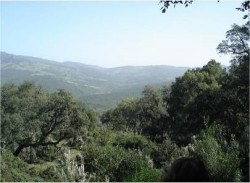A new Mediterranean Forestry Cluster: the key to sustainable local development
Taking place during the II Mediterranean Forest Innovation and Development Week from 12 to 14 May, this event brought together more than 60 representatives from the research community, governments, NGOs and industry, willing to find their match for future collaboration in forestry research, innovation and business activities. 'Engineers and policymakers have to stop talking and start acting,' stressed Mr. Chokri Taboubi, president of the GDA Oued El Maaden. Gathering around 100 local families, his association of farmers and foresters sustainably exploits Mediterranean forest products in order to ensure income for the local inhabitants. 'Keeping the value chain as close as possible to the forest is crucial to the fostering of awareness about the forest’s value,' he added. 'For example, we produce mastic oil but we don’t have the material needed to rightly label our bottles. We also craft parasols from diss grass but we have to buy the metallic parts far away from our village. All we need is to find the appropriate partners that could help us innovate, sell our products and share the benefits among the local population.' To provide innovative ideas and solutions for the forestry sector, actors from different backgrounds attended the brokerage event. Experts on forest certification (PEFC and FSC), on local development (UNDP-ART, FAO), on business creation (Warrant Group, CETIBA), NGOs (Association Abel Granier, WWF, Social Forest), as well as representatives of governmental administrations (DGF and DGA), forest owners and associations (CFC, GDA Sidi Amor), and researchers (CREAF, INRGREF), etc. all took part in this networking event. Forest degradation costs more than 50 million euros per year to Tunisia, a pattern that could only be stopped under a multi-actor approach. 'Our project identified the main actors of the Mediterranean forestry sector as well as the main challenges faced by the foresters, researchers and policymakers,' explained Enrique Doblas, CREAF researcher and MENFRI coordinator. 'Our role is therefore to gather all these actors in one room and allow them to discuss project ideas that could improve the situation locally.' This event was the first step of the MENFRI cluster activity. The team is currently developing an online matchmaking tool which will facilitate to find the right partner for the right action. In other words, to support forestry as an innovative, sustainable and job making sector.
Countries
Belgium, Spain, Italy, Morocco, Tunisia



